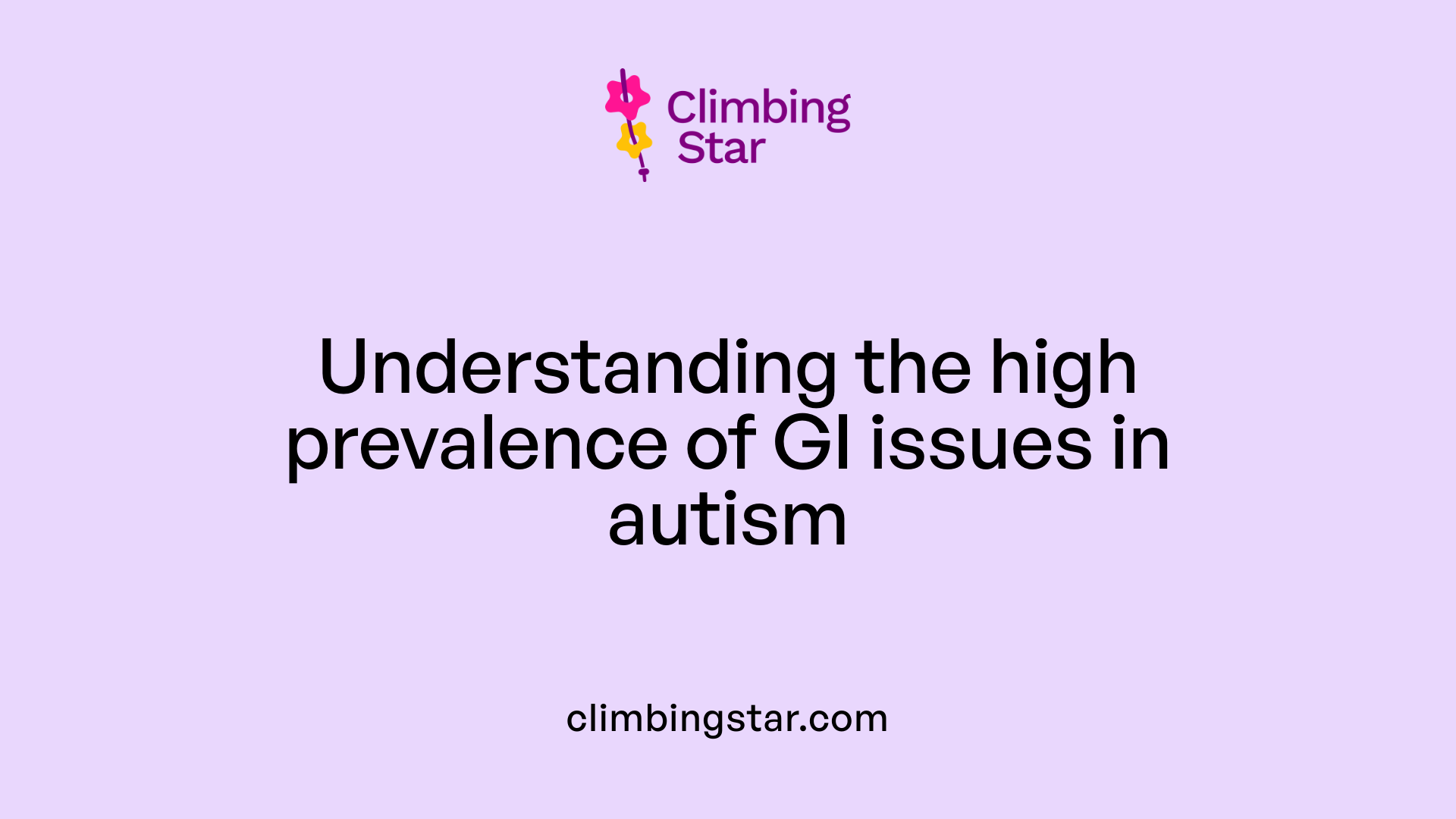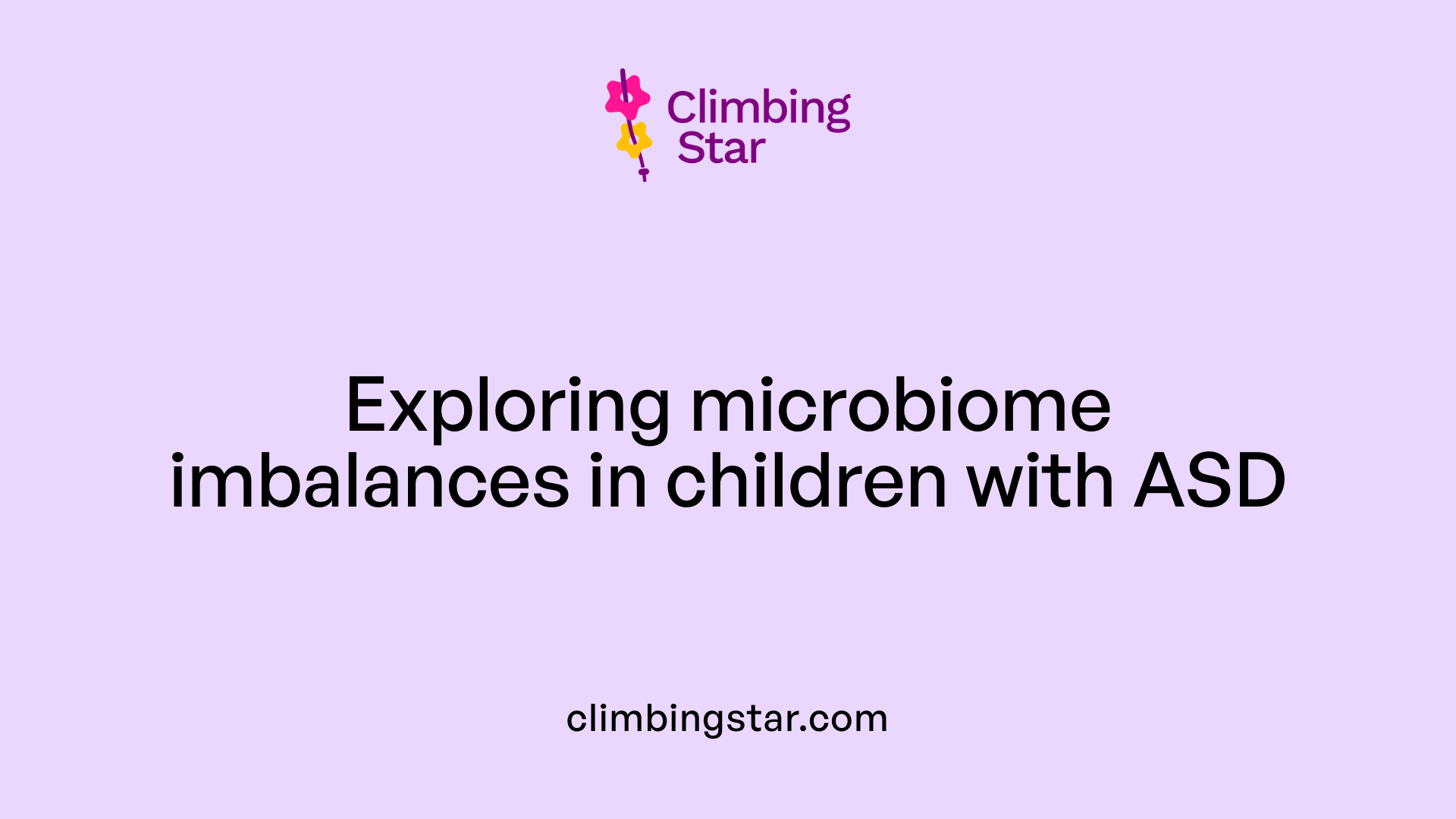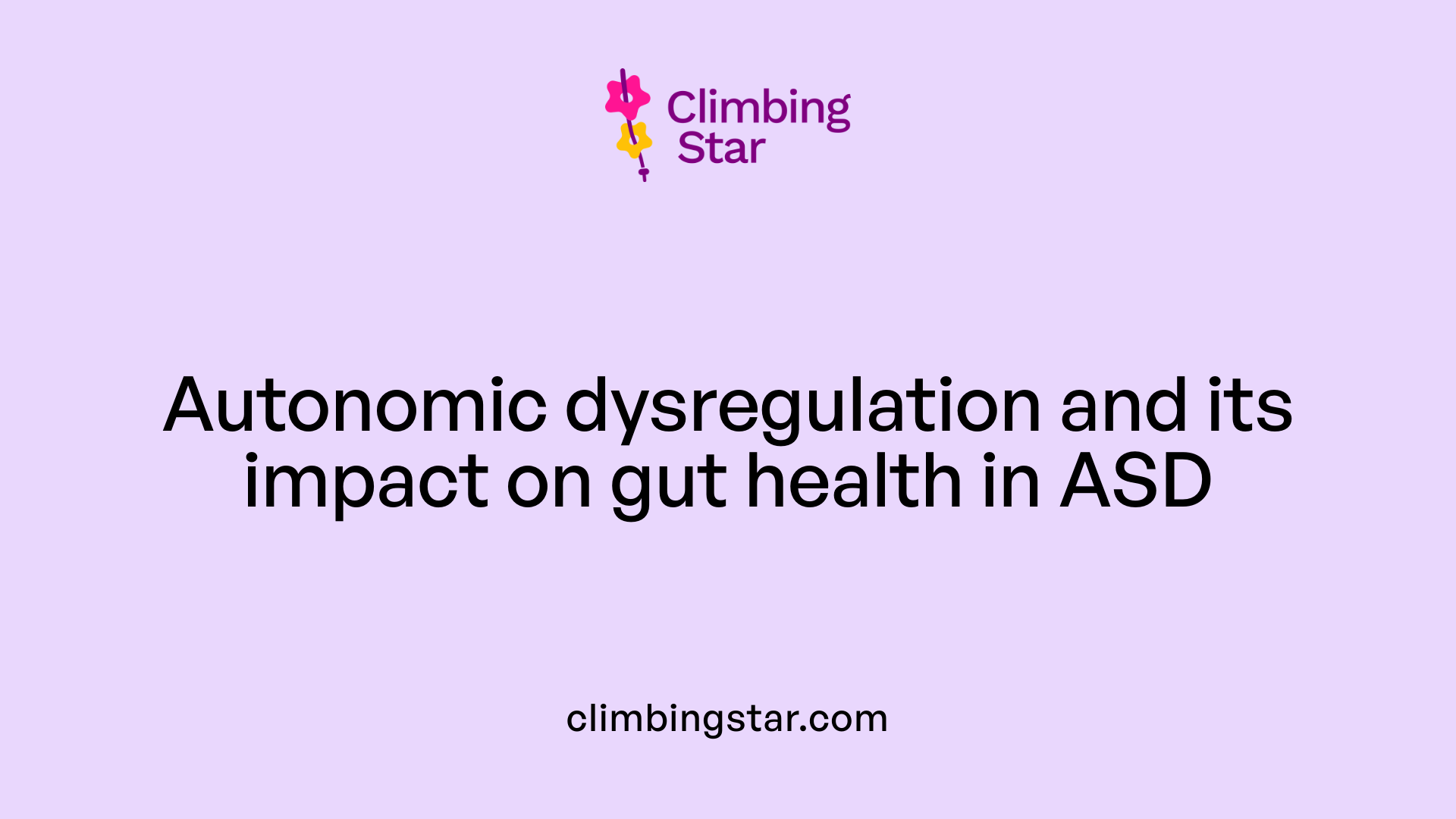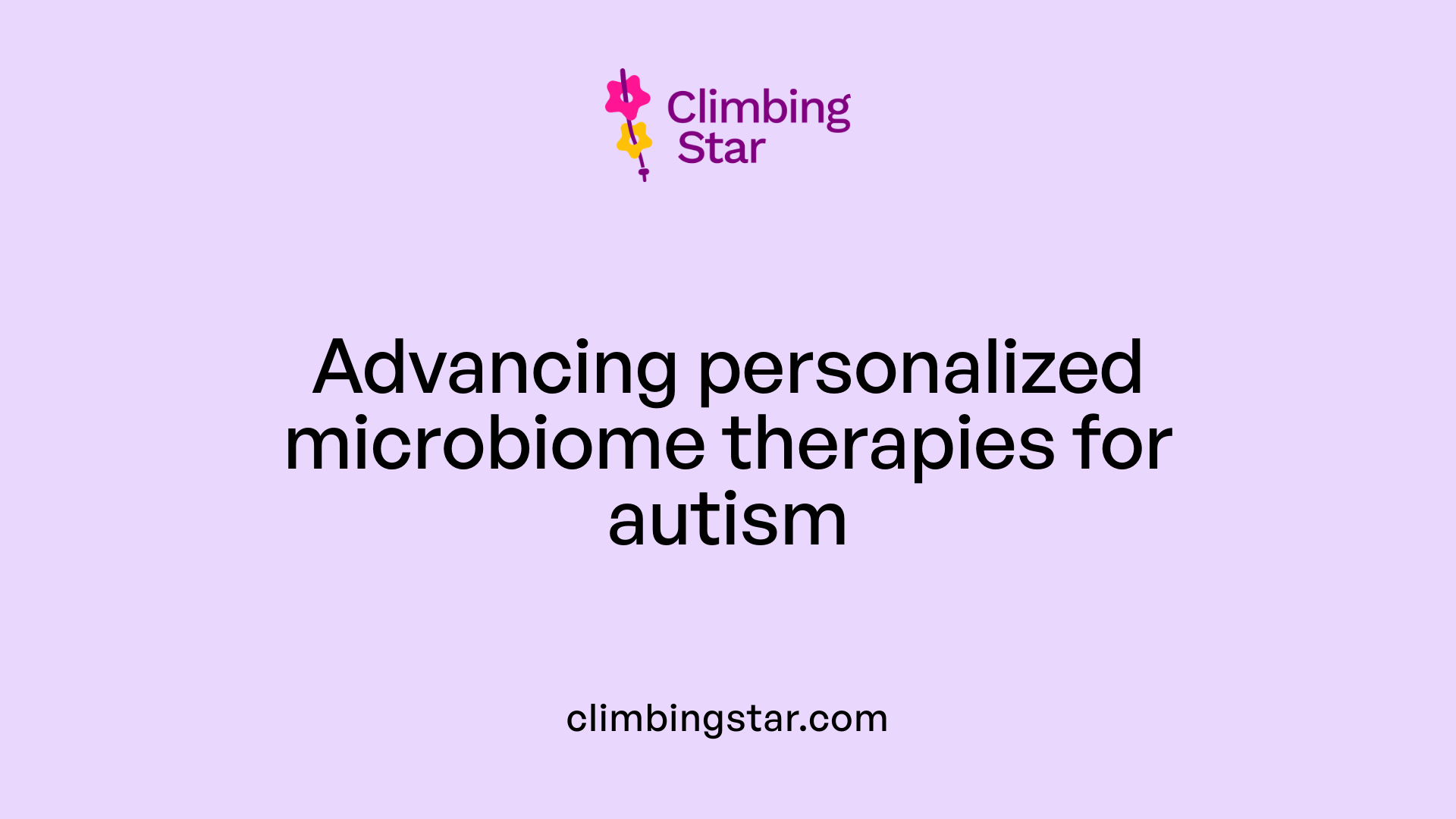Understanding the Gut-Autism Connection
Autism Spectrum Disorder (ASD) is a complex neurodevelopmental condition that impacts communication, behavior, and social interaction. While therapies like Applied Behavior Analysis (ABA) focus primarily on behavioral improvements, growing research reveals another critical aspect influencing autism: gut health. Gastrointestinal (GI) issues are prevalent among individuals with ASD, and scientific investigations into the gut microbiome, gut-brain interaction, and potential therapeutic interventions are shedding new light on this intricate connection. This article explores the role of gut health in autism, its implications for behavior and overall well-being, and how emerging treatments might complement traditional interventions like ABA therapy.
Prevalence and Nature of Gastrointestinal Symptoms in Autism

How prevalent are gastrointestinal issues among individuals with autism?
Gastrointestinal (GI) problems are extremely common in children with Autism Spectrum Disorder (ASD), affecting up to 80% of this population. These issues include symptoms such as constipation, diarrhea, abdominal pain, gastroesophageal reflux disease (GERD), and inflammatory bowel disease (IBD). A recent meta-analysis found that nearly half (47%) of individuals with autism experience GI symptoms. These digestive problems often have a profound effect on their overall health and daily quality of life.
How do gastrointestinal problems affect behavior in children with autism?
GI symptoms in children with ASD frequently correlate with behavioral changes. Discomfort from constipation or abdominal pain can lead to heightened stress, anxiety, and irritability, which may manifest as behavioral challenges. Because many children with autism struggle to communicate their physical distress, these symptoms can be overlooked, further exacerbating behavioral issues. The link between GI health and behavior underlines the importance of recognizing and managing gut problems to improve social, educational, and occupational functioning.
What challenges exist in recognizing GI issues in autistic individuals?
Detecting GI symptoms in children with autism presents unique challenges, as they may have difficulty verbalizing discomfort. To address this, specialized assessment tools like the Gastrointestinal and Related Behaviors Inventory (GIRBI) have been developed. These tools help caregivers and healthcare providers identify GI distress by observing related behaviors, enabling better diagnosis and targeted treatments. Improved recognition is critical for addressing the gastrointestinal needs of autistic individuals effectively and improving their overall well-being.
Gut Microbiota Differences in Autism Spectrum Disorder

How does the gut microbiome of children with ASD differ from neurotypical children?
Children with Autism Spectrum Disorder (ASD) show notable differences in their gut microbiome compared to neurotypical peers. This condition involves dysbiosis—an imbalance in gut bacteria—characterized by increased populations of certain bacterial genera such as Streptococcus, Lachnospiraceae_NC2004, Ruminococcus, and Lactococcus. Conversely, beneficial bacteria including Flavonifractor, UBA1819, Acinetobacter, Bifidobacterium, and Prevotella are found in reduced numbers.
These shifts not only alter the variety of bacteria but also impact microbial metabolic pathways, such as suppressed alpha-linolenic acid metabolism, which can affect neurodevelopment and behavior. The imbalance in gut microbiota may contribute to gastrointestinal symptoms commonly observed in ASD, like constipation and abdominal pain, and influence core behavioral characteristics.
Age and environmental factors influencing microbiota
Gut microbiota composition in children with ASD is also affected by age and environmental conditions. Factors such as diet, mode of delivery at birth, medication use, and overall environment play a significant role in shaping the microbial community. For example, dietary choices, including gluten-free or casein-free diets, can alter bacterial populations and their metabolic products.
Such variability highlights the need to consider multiple influences when studying microbiota differences in ASD. Research stresses the importance of controlling for these factors to better understand the relationship between gut bacteria and autism.
Understanding these differences in gut microbiota offers potential pathways for therapeutic interventions aimed at modulating the microbiome to improve gastrointestinal and neurological symptoms associated with ASD.
The Microbiota-Gut-Brain Axis and Its Role in Autism

What is the microbiota-gut-brain axis (MGBA), and how does it affect autism?
The microbiota-gut-brain axis (MGBA) is a sophisticated communication system that connects the gut microbiota and the brain. It involves multiple pathways including the vagal nerve, sacral nerve, autonomic nervous system, systemic hormones, and immune signaling. This network facilitates bidirectional communication between the gut and the brain, impacting neurological function and behavior.
Description of the gut-brain axis
Gut bacteria play an integral role within this axis. In children with autism spectrum disorder (ASD), the composition of gut microbial communities differs significantly from neurotypical peers. These microbiome alterations affect not only gastrointestinal (GI) health but also brain function, potentially affecting autism symptomatology.
Mechanisms of gut-brain communication
Communication occurs via neural, hormonal, and immune pathways. The vagus nerve, part of the parasympathetic nervous system, acts as a primary conduit for signaling between the gut and brain. Additionally, the autonomic nervous system, regulating 'fight or flight' and 'rest and digest' responses, shows altered activity in ASD, which may aggravate both anxiety and GI issues.
Immune system modulation also plays a part: dysregulation in the MGBA contributes to systemic inflammation and altered cytokine levels noted in ASD, which in turn can affect brain function and behavior.
Impact of microbial metabolites and immune modulation on the brain
Microbial metabolites like short-chain fatty acids (SCFAs), produced by gut bacteria, influence neurodevelopment and the central nervous system. In ASD, altered gut permeability allows microbial products and immune factors to enter circulation, potentially triggering neuroinflammation and immune dysregulation.
Overall, disturbances in the MGBA can impair critical aspects of neural development and function, contributing to both core symptoms of autism and associated gastrointestinal distress. Efforts to modulate this axis—through diet, probiotics, or microbial transplantation—are an active area of research aiming to improve outcomes in ASD.
Autonomic Nervous System Dysfunction and Gastrointestinal Symptoms in Autism

How does autonomic nervous system dysregulation manifest in individuals with autism, and what is its impact?
In individuals with autism spectrum disorder (ASD), the autonomic nervous system (ANS) often shows dysregulation characterized by increased activation of the sympathetic nervous system — the component responsible for the "fight or flight" response. This imbalance reduces the activity of the parasympathetic nervous system, which normally governs "rest and digest" functions crucial for gastrointestinal (GI) health.
This altered autonomic state has been linked to heightened anxiety and stress levels commonly observed in ASD. The amplified sympathetic drive can worsen GI symptoms such as constipation, diarrhea, and abdominal pain by impairing normal digestive processes.
Assessing autonomic function via heart rate variability and implications for GI health
Heart rate variability (HRV) serves as a non-invasive biomarker to evaluate the balance between sympathetic and parasympathetic activities in the ANS. Studies utilizing HRV measurements have documented that individuals with autism often display reduced parasympathetic tone and increased sympathetic dominance.
This autonomic imbalance directly influences gastrointestinal function and discomfort. Since the gut-brain axis relies heavily on autonomic signaling, disruptions in ANS regulation can worsen both GI and behavioral symptoms seen in ASD.
Understanding these interactions underscores the importance of developing therapeutic approaches targeting autonomic function to alleviate GI distress and associated behavioral challenges in autism.
Therapeutic Interventions Targeting Gut Health in ASD
Overview of Probiotics, Prebiotics, and Dietary Changes
Research into gut-focused therapies for autism spectrum disorder (ASD) includes the use of probiotics and prebiotics to beneficially modify the gut microbiota. Dietary interventions such as gluten-free and casein-free diets are also common, aiming to reduce gut inflammation and microbial imbalance. Additionally, vitamin supplementation has been explored to support overall gut and immune health in individuals with ASD.
Microbiota Transfer Therapy (FMT)
Fecal Microbiota Transplantation (FMT) is an emerging therapeutic approach showing potential in ASD treatment. Early studies have demonstrated that FMT can improve gut microbiota diversity and composition, leading to decreased gastrointestinal symptoms and reductions in core autism behavioral scores. However, these studies often include small cohorts and lack placebo controls, indicating the need for further rigorous trials.
Vagus Nerve Stimulation and Medication Approaches
Apart from microbial interventions, modulation of gut-brain communication through vagus nerve stimulation is under investigation. Medications targeting gut health and neural responses are also being studied to alleviate GI distress and related behavioral issues. These approaches recognize the complex gut-brain axis involving the autonomic nervous system, immune function, and neuroinflammation.
Study Results and Limitations
While preliminary findings suggest that therapies like probiotics, dietary changes, FMT, and neuromodulation can improve gastrointestinal and behavioral symptoms in children with ASD, the overall evidence remains inconclusive. Challenges include heterogeneous study designs, varied participant characteristics, and confounding factors such as diet, medication use, and co-existing gastrointestinal conditions. Standardized research methods and larger, placebo-controlled trials are essential to establish efficacy and safety.
| Intervention Type | Purpose | Current Evidence Status |
|---|---|---|
| Probiotics & Prebiotics | Modulate gut bacteria composition | Promising but inconclusive due to small, varied studies |
| Dietary Changes | Reduce inflammation & microbial imbalance | Widely used; mixed study results |
| FMT | Restore healthy microbiota | Preliminary positive outcomes; needs larger controlled studies |
| Vagus Nerve Stimulation | Influence gut-brain communication | Early-stage research with potential |
| Medications | Target GI symptoms and neural pathways | Under investigation; benefits not yet well established |
Current Challenges in Autism-Gut Microbiome Research
What are the main research challenges in studying the gut microbiome in autism?
Research into the gut microbiome's role in autism spectrum disorder (ASD) faces many obstacles stemming from variability and lack of standardization. Studies often differ in methodologies, including how microbiome samples are collected, processed, and analyzed. This inconsistency makes it difficult to compare findings across research.
Key influencers such as age, sex, diet, medication, and stool consistency significantly affect gut microbiome composition but are not always adequately controlled. For example, children with ASD may follow specialized diets or take medications that alter gut bacteria, confounding study results.
Without unified methodologies and meticulous control over these variables, interpreting the connection between gut microbiota and autism becomes challenging. The diversity in research designs reduces the reliability of conclusions about specific microbial signatures linked to ASD or the effectiveness of microbiome-based therapies.
Moving forward, the field requires standardized protocols for microbiome research and careful adjustment for confounding factors. This approach will improve the accuracy, reproducibility, and clinical relevance of findings, ultimately advancing our understanding of how gut bacteria influence autism and guiding tailored interventions.
Integration of Gut Health Insights with Applied Behavior Analysis (ABA) Therapy
What is Applied Behavior Analysis (ABA) therapy?
Applied Behavior Analysis (ABA) therapy is a well-established, scientifically based behavioral intervention aimed at improving social, communication, and learning skills in individuals with autism spectrum disorder (ASD). It employs techniques like positive reinforcement and the antecedent-behavior-consequence (A-B-C) model. Therapies are customized to meet individual needs and are typically administered by trained professionals such as Board Certified Behavior Analysts (BCBAs).
How does ABA therapy benefit individuals with autism?
ABA therapy helps individuals develop vital communication and social skills while working to reduce challenging behaviors. Early and intensive ABA programs have been shown to result in significant improvements in cognition, language, and social interactions. These gains contribute to greater independence and enhance overall quality of life for people with autism.
Potential synergy between behavioral and gut-focused interventions
Emerging evidence indicates a strong link between gut health and autism symptoms. Children with ASD frequently experience gastrointestinal issues and altered gut microbiota, which may exacerbate behavioral challenges. Combining gut-focused treatments—such as probiotics, dietary modifications, and microbiome therapies—with ABA could augment behavioral progress by addressing underlying biological factors.
Importance of individualized treatment approaches
Since autism presents heterogeneously, and gut microbiota profiles vary widely among individuals, treatment must be personalized. Tailoring interventions by integrating behavioral strategies like ABA with gut health management can optimize outcomes. Such a holistic, multidisciplinary approach considers both neurological and physiological contributors to ASD symptoms, offering a comprehensive path forward.
Who Provides ABA Therapy and How It Is Delivered
Qualified ABA Providers and Certification
ABA therapy is provided by professionals with specialized training and certification, primarily Board Certified Behavior Analysts (BCBAs), licensed therapists, and trained behavior technicians. These experts have completed rigorous education and practical experience requirements to deliver evidence-based behavioral interventions tailored to individual needs.
Settings for Therapy Delivery
ABA services are versatile and can be delivered in various settings depending on the child’s requirements and family preferences. Common environments include the child’s home, schools, clinics, and community settings. This flexibility ensures interventions occur in natural contexts where skills are most applicable.
Caregiver Involvement and Program Customization
A hallmark of effective ABA therapy involves active caregiver participation. Providers collaborate closely with family members, offering training and support to reinforce therapeutic strategies outside of sessions. Each ABA program is customized based on comprehensive behavioral assessments, ensuring therapy goals and techniques address the unique strengths and challenges of the child. Ongoing data collection and progress monitoring further refine interventions to maximize outcomes.
Future Directions in Gut Health and Autism Research and Therapy

What future research and clinical directions are important in gut health and autism?
Advancing our understanding of the relationship between gut health and autism spectrum disorder (ASD) requires a multidimensional approach. Future research must utilize diverse assessment methods, including advanced biospecimen analyses and tailored tools specific to different age groups, to accurately characterize gastrointestinal symptoms and microbiome variations in individuals with ASD.
The development of personalized microbiome-based interventions holds promise. Tailored therapies such as probiotics, prebiotics, dietary modifications, and microbiota transplantation could potentially improve behavioral and gastrointestinal symptoms by targeting each individual's unique gut flora composition and immune profile. However, rigorous, standardized clinical trials are needed to establish efficacy and safety.
A critical area for progress is the education and training of healthcare providers. Many GI symptoms in autistic individuals remain under-recognized due to communication challenges and lack of specialized assessment tools. Enhancing provider knowledge about the complex gut-brain interactions and the significance of gastrointestinal issues in autism will lead to better diagnosis, management, and improved patient outcomes.
Overall, integrating comprehensive microbiome research with targeted clinical strategies and educational initiatives will be essential to optimize care and quality of life for individuals with ASD experiencing gastrointestinal difficulties.
Towards a Holistic Understanding of Autism Care
The intersection of gut health and autism represents a promising frontier, revealing the significant role gastrointestinal function and microbiota play in influencing neurological development and behavioral symptoms. While Applied Behavior Analysis remains a cornerstone of autism treatment, integrating emerging insights on gut microbiome dysbiosis, autonomic nervous system dysfunction, and immune modulation could pave the way for more comprehensive, personalized therapeutic approaches. Continued multidisciplinary research, standardized methodologies, and enhanced healthcare provider training are essential to harnessing these insights effectively. Ultimately, addressing both behavioral and physiological aspects holds great potential to improve the quality of life and functional outcomes for individuals on the autism spectrum.
References
- The complex interplay between autism spectrum disorder ...
- Nutrition and the Gut-Brain Connection
- Impact of gut health and microbiome on autism spectrum ...
- The Gut, Autism, and Mental Health
- Gut microbiota and autism spectrum disorder: advances in ...
- Applied Behavior Analysis (ABA)
- Applied Behavior Analysis (ABA)






